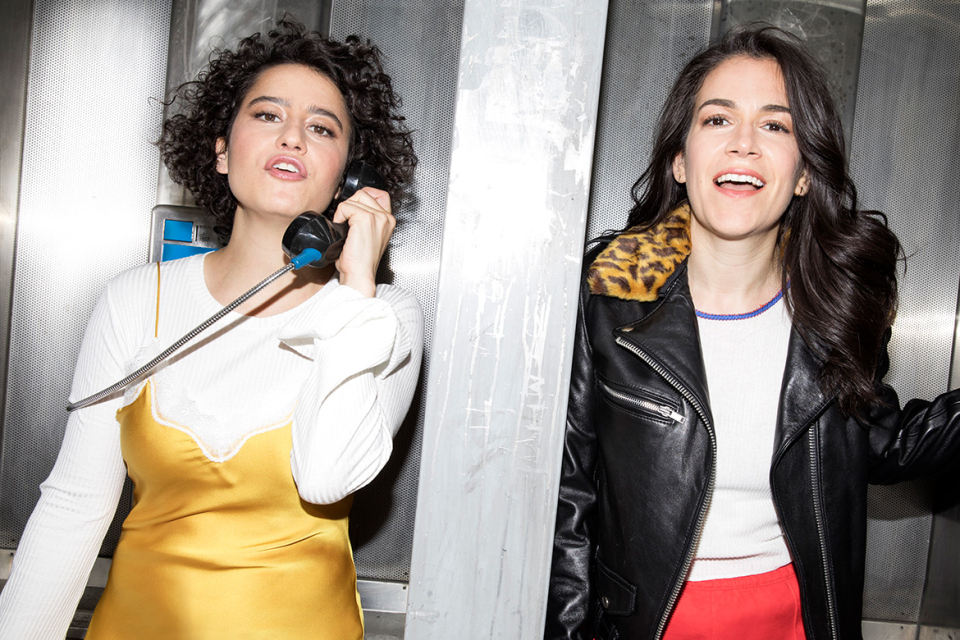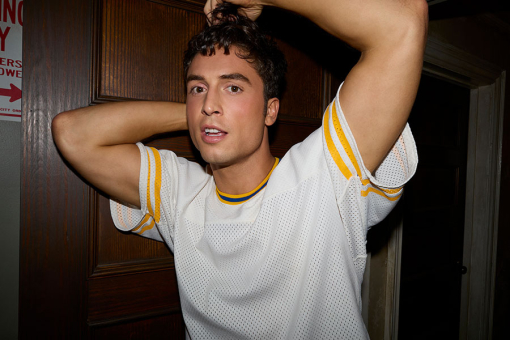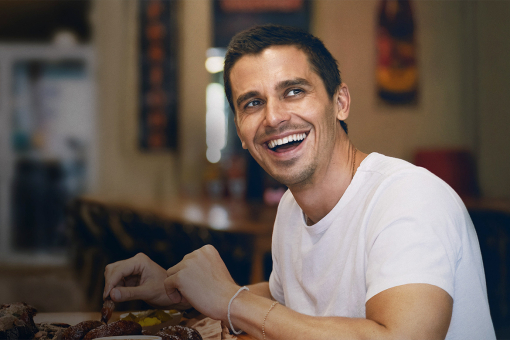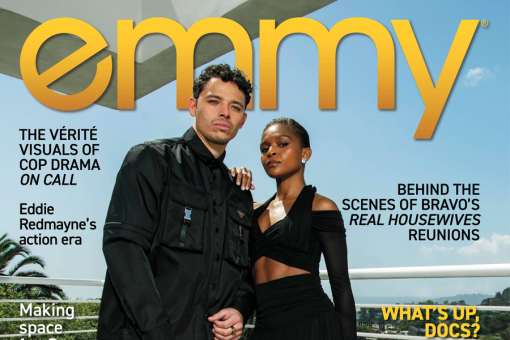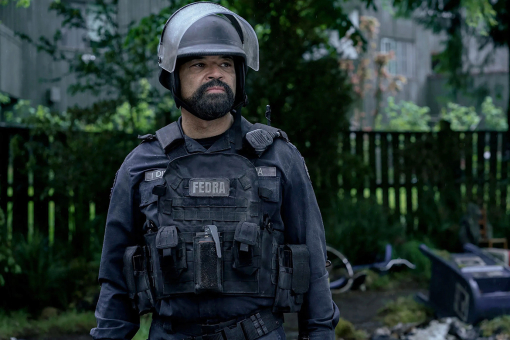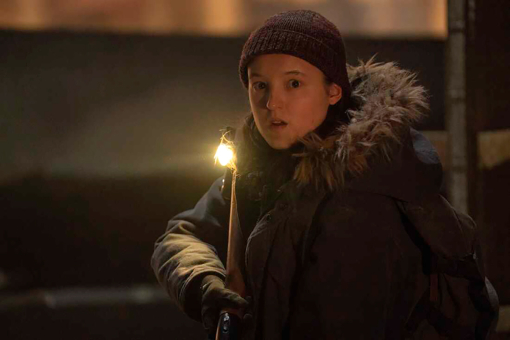On January 22, 2014, a blizzard that charged through the East Coast dropped two feet of snow in Boston. Meanwhile, two Millennial friends named Abbi Jacobson and Ilana Glazer dropped a series on Comedy Central called Broad City.
The latter proved to have a much more sizable impact.
“It’s taken me a while to be able to look at what we did and marvel at it,” Glazer says. “But when we do reminisce, it goes down to our core. We were so young, and it was such a new, enormous experience. It’s, like, in our spines.”
For five years, Glazer and Jacobson played exaggerated versions of themselves as they navigated the left-of-center side of New York City. That meant no strutting in stilettos and analyzing bad dates while sipping cosmopolitans at swanky nightclubs. Instead, these devoted twentysomethings liked to get high and consume themselves with urban angst: Bed bugs! Airport travel stress! An accidental apartment lock-out! Searching for a stolen iPhone! And while they did embark on romantic entanglements (poor Blake Griffin), there was no doubt that Glazer’s and Jacobson’s true soulmates were each other. “The show really was an extension and amplification of us,” Jacobson says.
Like most acclaimed comedies, Broad City took a long and sobering road to success. Glazer and Jacobson — influenced by everything from Friends to Jerry Seinfeld — started Broad City as a minor-key web series to showcase their talents. Even after Amy Poehler agreed to help shepherd the show into a bigger production, it languished in development hell for years before Comedy Central picked it up. “There was definitely a slow buildup,” Glazer adds.
It quickly became part of a Comedy Central renaissance that included Key & Peele, Detroiters and Inside Amy Schumer. Thanks to its staunch following, stars including Seth Rogen, Kelly Ripa and even Hillary Clinton popped up in sublime guest spots. Glazer and Jacobson became cultural comedy darlings. After all, not every actress on a basic-cable series gets to be the subject of a glowing profile in The New Yorker. And The New York Times. And Rolling Stone. To paraphrase one of their signature catchphrases, “Yas queens.”
Upon its 2019 finale, the series had already left its mark as a joyous ode to romantic friendship. Sure, it only nabbed a single Emmy nomination (for Outstanding Motion Design in 2018, honoring an animated episode in which the two trip on mushrooms). But Glazer and Jacobson’s baby, now streaming on Hulu, remains golden. “I am proud to claim its timelessness,” Glazer says. “I think it’s because Abbi and I were so true to ourselves.”
In honor of Broad City’s 10th anniversary, its principals in front of and behind the camera tell all to emmy contributor Mara Reinstein.
Origin Story
Glazer and Jacobson, who met in the NYC improv group Upright Citizens Brigade in 2006, clicked immediately and became professional partners. In 2010, they premiered a web series based on their friendship called Broad City. They produced 18 episodes in a year.
Abbi Jacobson (star, creator, director, writer, executive producer): My first impression of Ilana was “Holy shit, the girl from Arrested Development [Alia Shawkat] is in my improv practice group!” Also, wow, she is unlike anyone I have ever met. I want to be around this person.
Ilana Glazer (star, creator, director, writer, executive producer): I was 19 when I met Abbi. I knew she was a down-ass bitch. Scrappy, athletic, curious. She had a confidence about her. I knew she was an artist, and that enchanted me.
Jacobson: We had such chutzpah and hustle and drive.
Glazer: We were absolutely obsessed with making a web series. At first, we were experimenting. And then we put it on Facebook and YouTube, and there was a snowball effect.
Jacobson: Facebook, ha!
Glazer: We got such a response from people loving it, and we got addicted to that feedback. We kept going and going and going and started to event-ize each episode. We made a release schedule. We used all our money to pay for production and editing and cabs for people to show up to the set. And for our finale, we asked Amy Poehler to be in it. We were connected to her through the UCB improv school. [Poehler is a founding member.]
Amy Poehler (executive producer, director): I don’t think I’d ever seen them perform, but I knew who they were and that they were part of a talented UCB group. I remember their email to me was delightful! And they were filming right down the street from my house, so that helped. Then, when I watched their stuff, I was like, “Oh, they’re cool and funny and have a distinctive POV with a true authentic friendship that came through.” I’m a sucker for all those things.
Glazer: We had been writing a pilot and were trying to sell it in L.A. But then she was in the webisode finale and we formally asked her in an email if she was interested in executive-producing our TV show. We said, “There was a gasp across the room when you came on the screen.”
Poehler: I just felt like I could be of use to them. You know, keep what was special about them intact but maybe expand a little and broaden it out. So I was just like, “Yeah, let’s do it.”
Jacobson: She was our hero and still is. I feel so lucky in terms of collaborating with, like, a true comedic giant. But it’s not like Amy just did it. We went after her.
Glazer: She joined us for these pitch meetings. We were just going to go into these executives like two knuckleheads. With her in the room, it was a totally different thing.
Jacobson: But it was slow-moving.
Glazer: First, we sold it to FX and developed it there for a year.
Jacobson: We thought we had a good thing. Then they passed on it. It was “too girly.” Who knows what was really going on behind the scenes there.
Glazer: I always think it was a positive thing that FX passed. At least we got that experience.
Poehler: I feel like I was especially helpful in what I like to call “the bottom of show mountain,” where the stakes are really high and everything feels very life or death. I was able to have a little more perspective on it, and how to find the right match. A producer’s job, among many things, is to protect the talent and know that if you really want the show to get made, you have to hustle.
Jacobson: Once we got to Comedy Central, I think they just thought it was really funny, and they just trusted us.
Poehler: I had a good relationship with Comedy Central for many years. [Then-president] Kent Alterman and [then-senior vice president] Brooke Posch were real champions and just got it. And it was an exciting time at the network, because they had interesting voices over there with Key & Peele. Through the whole process, I do think I was able to keep us motivated. I hope.
The Big Launch
Jacobson and Glazer staffed their writers’ room with two friends from their UCB days: Lucia Aniello and Paul W. Downs (who also played Trey, Abbi’s insecure boss at a trendy fitness studio). The pilot perfectly encapsulated the show’s vibe: Desperate to scrape together money to go to a Lil’ Wayne concert, besties Ilana Wexler and Abbi Abrams decide to clean apartments. One client is an adult dressed as a baby.
Lucia Aniello (writer, director, executive producer): The two of them were like lightning in a bottle, and we didn’t want to underplay it or overplay it. It couldn’t be broad or too subtle. It just needed to be heightened. So we spent a lot of time figuring out the right tone. That was definitely a discussion and worked on — not only in the writers’ room, but while we were shooting and in the edit.
Poehler: I remember Ilana and Abbi wanted to give themselves fake names. I was like, “You guys should be Abbi and Ilana.” I don’t know if they regret that idea. But they were very clear about their point of view and had an incredible work ethic.
Paul W. Downs (actor, writer, director, executive producer): All of it came together quickly. I think we had, like, 12 weeks to do 10 episodes every year.
Hannibal Buress (actor, Lincoln Rice): I did an episode of the web series as a guy on a date with Ilana, and then they asked me to be on the show and kind of reprise the character. They wanted Lincoln to be a dentist who wanted this long-term relationship with Ilana. But it was a wild entrance — she’s talking on a laptop to Abbi while I’m right there with her [having sex] in bed!
Downs: There was a lot of sex positivity to Ilana’s character!
Fred Armisen (guest star, David the Baby): Amy texted me and said she was producing this show and asked me if I wanted to be in the pilot. She said something like, “You’re doing this thing where you say, ‘I’m a little baby.’” And I was like, “Just tell me where you need me to be.” Because it’s her, of course, whatever. It sounded like fun, and I trusted her.
Downs: There is something about the show that represents the real New York, and the real New York is stranger than fiction. So even though the Fred Armisen character is seemingly comedic, it’s absolutely true that this person could be found on Craig’s List.
Aniello: We didn’t want it to be a sketch show, but it did have some pretty wild and big moments.
Armisen: It was great off the bat, and I remained a fan even after my episode was done. I remember it hit pretty quick. People around me were talking about it, whether it was at a dinner or a social event — friends who were not necessarily comedy writers. Broad City wasn’t a secret.
Poehler: I knew people would gobble it up. I still think we’re hungry for female friendship on TV. And the show was just a vibe.
Aniello: Because the writing felt so real and colloquial and neutral, I think people got confused and thought it was improv and loose. But it took a lot of work to make it look so natural.
Glazer: After we premiered, a Wall Street Journal writer said the show was “sneak-attack feminism.” We were like, “Feminism, huh?” We had no idea. There was no public discourse around identity politics the way there is today. But I look back now, and we were so queer compared to other shows on TV. And we so incorporated our Jewishness into the show. Jacobson: We did talk a lot about it later, about how we were like Joey and Chandler [on Friends]. But ultimately this was a show based on our friendship. We weren’t creating a friendship on the show. We weren’t creating this dynamic. That dynamic is what made us laugh, so it made sense. That was always our jumping-off point.
Guest-Star Nirvana
How do you really judge TV success? In the case of Broad City, the answer wasn’t necessarily respectable ratings. After the season-one finale, Lady Gaga tweeted, “There are not enough episodes of Broad City. … It is my life.” Ahead of season two, Glazer and Jacobson proliferated across the media. Celebrities soon took notice and did guest spots, resulting in some of the series’ most memorable episodes.
Jen Statsky (writer, co-executive producer): I joined the writers’ room in season two, and that’s when it was starting to become more and more of a phenomenon. Abbi and Ilana were profiled in The New Yorker. There were Critics Choice nominations.
Buress: I could sense that things were shifting. You shoot a web series and it’s a small team. I think we were shooting in a crew member’s apartment. Now there were trucks and trailers and locations in New York City. Then a lot of people started watching and reacting to what we were doing.
Glazer: We were never a broad mass-appeal hit, but we were probably a cultural hit.
Jacobson: We did get access to ratings, which was fascinating. That feels like a past thing in the streaming world. But it was like, “Oh, God, this person knows about the show?” And then as the seasons progressed, we were able to ask people we were interested in to be on the show, and they started saying yes. I remember being so excited and sort of dumbfounded about it.
Statsky: I think what attracted the big names was the same thing that attracted many fans: You were seeing a relationship so true to life. I think people started to gravitate to that. And then we would say, “Hey, come do the show and try something you’ve never done before.”
Jacobson: Getting Seth Rogen for the season-two premiere was big. [He played one of Abbi’s bedroom partners who later succumbs to summertime heat stroke.]
Glazer: When we shot with Hillary Clinton [in season three], I lost my damn mind. We purposely wrote the scene to be freaking out so we could straight-up freak out meeting her. And we both nearly fainted. Like, we were losing our breath.
Poehler: I honestly don’t even remember how we got her. I think we were just all trying to figure out how to make it happen. But it was a really fun day.
Downs: You know who was super down and wild and fun? Kelly Ripa [in season two]. She was so cool and down for anything that I wrote. And the best guest star in the world is Amy Sedaris [from season one]. She’s the MVP of the show, and we brought her back because she was so fantastic.
Statsky: Amy may be my favorite because she’s so wildly funny. She played a realtor, and she’s wearing a neck brace. Just an incredible cameo. I’m a huge NBA fan, so getting Blake Griffin [as one of Ilana’s one-night stands in season three] was important to me. Whoopi Goldberg [in season three] is iconic and was so good, too.
Aniello: Rachel Dratch as the temp lady [in season five] was really fun. And so was Wanda Sykes [in season four].
Jacobson: One of the dumbest early jokes in the show was my character lying about training Shania Twain at the gym. I say “Twain” because it sounds like “train.” And then we went out to her, and it was wild that she was down to have fun with us [in season four]. I love it when she says, “Man, I feel like a smoothie!” She just sent me a photo of someone at one of her concerts holding up a big poster with the line.
Statsky: I love the episode where they go to Florida in season four. It was funny because it’s a show about the trials of tribulations of living in New York City, but every New Yorker can relate to the fantasy of living somewhere else. Because New York is wonderful, but it’s also really hard. Susie Essman and Fran Drescher are in it [as Ilana’s mom and aunt, respectively].
Glazer: In terms of watching and making it, the episode “Florida” is my favorite. I had the opportunity to direct it, and we shot it at a condominium complex where I was going to visit my grandma [to clean out her place] and where my parents now have a condo.
Jacobson: We all went away, and we never did that. It was like we all went on vacation and got to work.
Glazer: It was a real dream come true to just really capture the New York and Florida Jew thing and how people filter the other people coming into the condo community. And we had Abbi’s frizzy hair. We called it “The Beyoncé.”
That’s A Wrap
All good series must eventually come to an end. In the 50th and final Broad City episode — which aired March 28, 2019 — the pair meander through New York City and discuss cheese security protocols, Steamboat Willie, the allure of a $10,000 toilet and the secret agenda of the U.S. Postal Service, all on the eve of Abbi’s move to Colorado for an artist’s fellowship. In the poignant last scene, the perspective shifts from our two heroines to new sets of gossipy girlfriends. Call it an invitation for others to tell the Broad City story for a new generation.
Glazer: The end felt inevitable. Something had to change in their friendship. It could have been the Ilana character going to become a therapist or something. Or one of them gets into a relationship. But it was our choice, and the reason we chose it was because it was time for these friends to build their individualism.
Jacobson: It made me think of Bridesmaids — someone gets married, and there’s a big shift. But in Seinfeld, there is no shift ever. They all end up in a jail cell together, and there’s no growth. So even though we were having fun, we wanted them to change. It was exciting to us as actors and directors and producers. It was also a little meta, because I started spending more and more time in Los Angeles.
Aniello: There was a natural evolution. It made sense that Abbi’s character wanted to try to figure out her next steps in life, while Ilana would want to double down on New York. The show was about these girls trying to figure it out, and by the time the series ended, they had kind of figured it out.
Poehler: The last day of shooting was an all-nighter, which is so Broad City. We got to film on the Brooklyn Bridge, and we wrote our names on the bridge with the message “Broad City Forever.” I still have the pictures.
Statsky: I didn’t write my name on the bridge because I’m not a criminal. I’d be very curious to know if the names are still there.
Poehler: We had a scene that was a rooftop party, and it was freezing cold. Typical New York, where you’re either dying of heat or you’re freezing. We were all there huddled together and saying goodbye. It was really moving.
Statsky: Those last few days were really bittersweet. I’ve been lucky enough to be around for the end of Broad City and The Good Place and Parks & Recreation, and it’s always sad to say goodbye to this world you’ve built. You also feel a lot of pride and joy and an enormous sense of achievement.
Buress: As creatives, Abbi and Ilana were able to take their project and elevate and maintain it for five years. They got it done. I was impressed.
The Legacy
Glazer and Jacobson remain close despite their literal distance. Jacobson now resides in L.A. and cocreated and starred in the 2022 Prime Video adaptation of A League of Their Own. She will appear in the Netflix dark comedy series No Good Deed. Glazer, married with a daughter, lives in New York City and appeared in the Apple TV+ comedy The Afterparty. Writers Downs, Aniello and Statsky created the Emmy-winning Max comedy series Hacks. They all see their Broad City era as, well, a professional high.
Armisen: You know how Herman’s Hermits look at the ’60s and think of themselves as part of that British Invasion? Well, I’d like to think that Portlandia and Key & Peele and Broad City were part of a comedy movement. And it hasn’t faded! People still come up to me and say, “I’m a little baby.”
Buress: It was a really dope time for me. The role and the series just connected with people differently compared to the other stuff I’ve done.
Jacobson: A legacy? I don’t know. Let the viewers decide.
Statsky: It for sure has a legacy. Abbi and Ilana portrayed characters that just resonated with people in a certain way. I still see it 10 years later — it made people feel seen in a way that they hadn’t felt seen before, both in terms of their friendships with other women and just seeing a woman in her 20s trying to make it in New York City. That’s not a brand-new phenomenon, but they were so specific in their characters.
Jacobson: We’ve talked about reviving it, but I don’t know if either one of us is there yet. It would have to be organic.
Glazer: Yeah, I feel like I haven’t nailed my individual perspective yet. Broad City was about figuring out my voice when I was young and starting in comedy. I’d like to achieve more before I return to it.
Downs: It was our first foray into making comedy for television. It was like when you move to New York for the first time and you get your first apartment and you find some weird roommate. It’s a very particular slice of life. We were just starting out, too, so it will always hold a very special place in our hearts.
Glazer: The show was created so carefully from the inside out. Sometimes to its detriment. I mean, we’re not looking at ourselves from the outside at all. We weren’t capable of it. I think we touched on something transcendent of fads or trends. It was just about the friendship.
Jacobson: I often send Ilana old press photos of things we did early on. They just crack me up. They’re mortifying. Our style is so bad. It looks like we needed help. But I’m so thankful those photos exist, because we were so real right out of the gate.
Poehler: Oh my god, I’m so proud. I do not take my experience on the show for granted. I love those women. I talk to Ilana and Abbi all the time. I’m still trying to find a way to feed them and hug them. If you’re lucky, you get to work with people you love. And if you’re working on something good that people notice, then you’re the luckiest person in the world.



